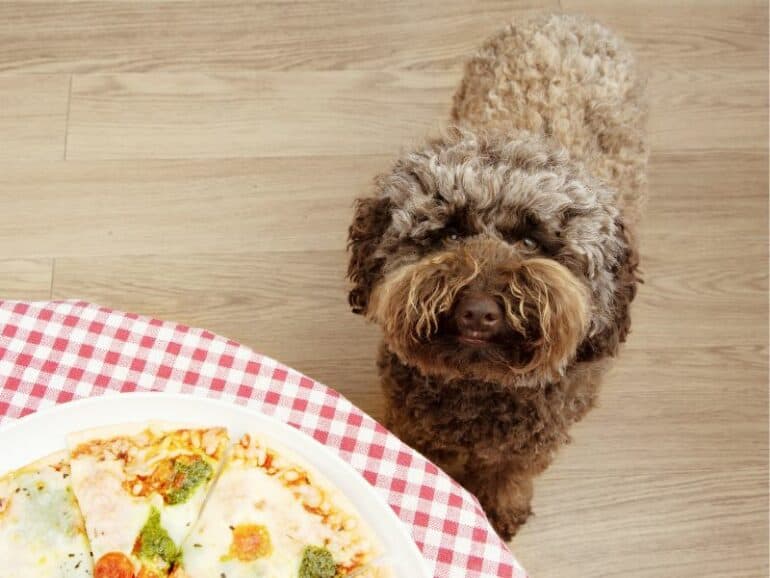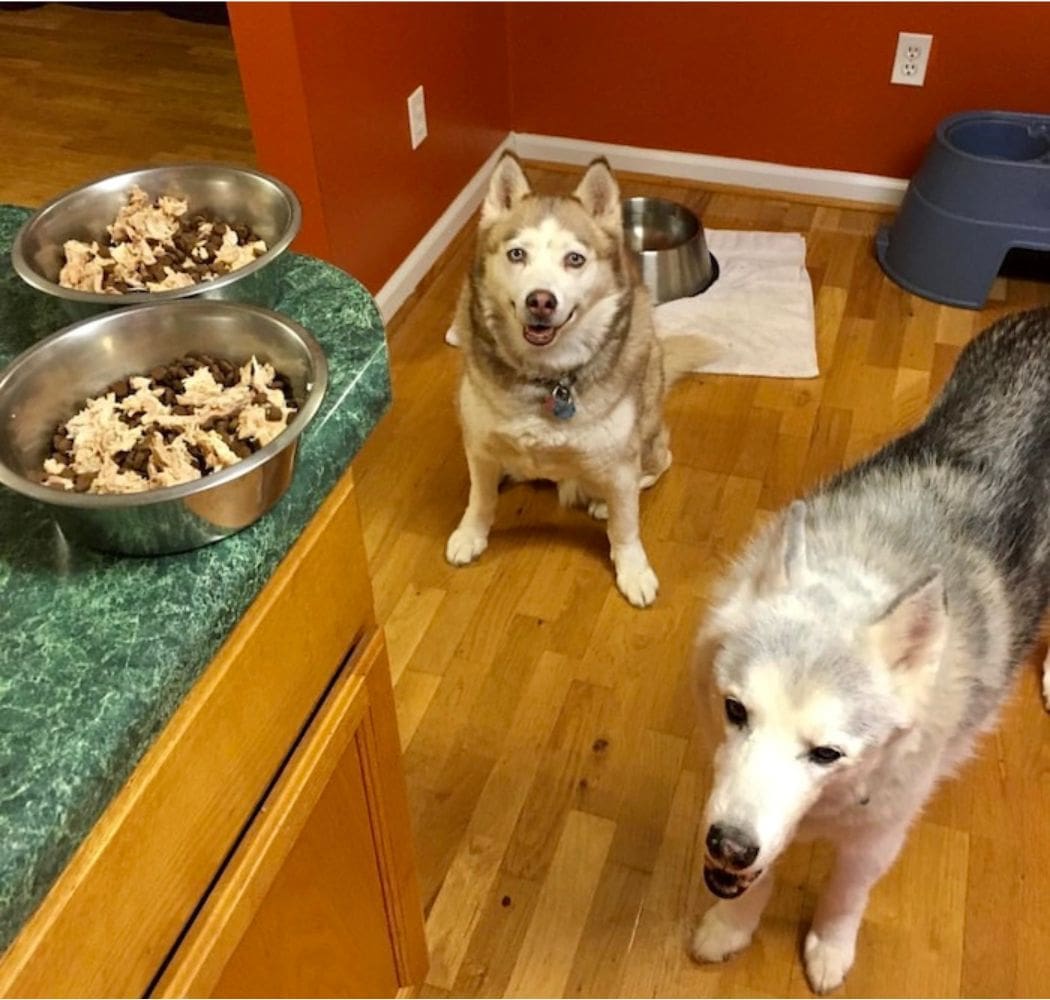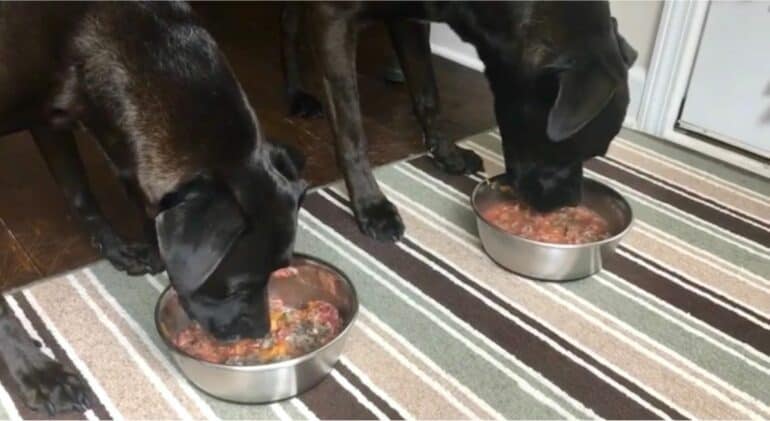My Dog Won’t Eat Dog Food But Will Eat Human Food, What Should I Do?
This post may contain affiliate links. We may earn money or products from the companies mentioned in this post.
A taste of your grilled steak, some roasted cauliflower and a spoonful of pasta instead of kibble?
If your dog won’t eat dog food but will eat human foods such as these, rest assured you’re not alone with a picky eater on your hands.
The good news is that I found a solution for my pup, and I know that the picky dog client eaters were cured of their bizarre behavior as well.


Spoiler alert: They range from behavioral and annoying to medical and concerning.
That said, read on to learn about the different reasons your dog won’t eat his food.
I’ll also point out practical solutions to help you address the issue and ensure your dog receives the nutrition they need.
I used to have one myself and was able to observe this behavior in several of my pet sitting clients as well.
Why Won’t My Dog Eat His Food?
First things first, let’s look at some of the reasons why your dog will eat human food but not dog food.
Taste Preferences
Dogs, like humans, have individual food preferences. They may find certain dog foods unappealing due to their aroma, texture, or taste, which leads to a lack of interest.
This was the case with my dog Buzz, a 75 lb Boxer mix. He would politely sniff his kibble, eat a few bites and then walk away from his bowl.
Before I found something that worked for him, I must have tried 10 different kibble brands and rotated between their respective recipes and flavors.
Chicken and sweet potatoes for one month, wild-caught salmon the next, lamb and brown rice the month after that, etc.
Whenever I presented him with a new dog food option, he seemed interested at first and would eat the new dog food for a couple days.
Then he decided that nope, he wasn’t interested any more unless I would top the dog food off with some human food.
Interestingly enough, his sister Missy (from the same litter) always inhaled whatever food landed in her dog food bowl. It didn’t matter if it was dry dog food, canned dog food or human table scraps.
So with her, I experienced the opposite end of the dog feeding spectrum.
As a matter of fact, I always had to supervise feeding time because Missy was not shy about eating her brother’s leftover dog food, too!


One of my former pet sitting clients, Rocky
Reinforcement
If you’ve rewarded your dog with table scraps or human food in the past, this can create a habit and reinforce the behavior of seeking out human food.
I’ve seen this with Lila, my former roommate’s dog. She was a cute little black pup who – dare I say it – was spoiled rotten.
Her owner always shared her human food with her, and she was even allowed to eat right from the dining room table.
Lila truly was the epitome of a furry child and, as a consequence, snubbed her dog food bowl.
I remember seeing her eat a few bites, and then push the bowl and its contents around the kitchen and dining room area.
Then her mom got home with Sushi and, guess what, Lila devoured her share although she still had most of the kibble left in her bowl.
Dental Problems
If your dog has dental issues like infected gums or rotting teeth, eating dry dog food like kibble can hurt them.
Softer foods such as your own will be easier to eat, and I’ve experienced this with my former senior Husky client, Milo.
He was used to getting his dry dog food topped off with cooked chicken breast for years, and for the longest time, he ate both foods no problem.
Until one day, he stopped eating the kibble and only ate the chicken.
Turns out that Milo had a couple of bad teeth that were bothering him when he ate kibble, so he turned to the soft chicken breast instead.
After his dental issues were treated, he was fine eating the kibble and chicken again.


Milo (right) and his sister Haley with their chicken-topped off kibble
What If A Dog Only Eats Human Food?
If a dog only eats human food and refuses their designated dog food, it can present challenges in terms of providing a balanced and nutritious diet.
Here are some potential consequences of nutrient deficiencies in dogs:
Essential nutrients, such as vitamins and minerals, play a crucial role in supporting a dog’s immune system.
For example, a deficiency in glucosamine and chondroitin can lead to weakened connective tissues, a lack of Vitamin K impairs wound healing, and a calcium deficiency can result in skeletal abnormalities and weakened bones.
Without an adequate intake of these nutrients, a dog’s immune system can weaken, which makes them more susceptible to infections, illnesses, and slow healing.
Puppies, in particular, require proper nutrition for healthy growth and development.
Deficiencies in essential nutrients, such as proteins, calcium, and vitamins, can lead to stunted growth, bone abnormalities, and impaired organ development.
Also, dogs need the right balance between nutrients like omega-3 and omega-6 fatty acids, biotin, and zinc as they’re essential for maintaining healthy skin and fur in dogs.
Without these nutrients, dogs may experience dry, flaky skin, a dull or brittle coat, excessive shedding, and increased susceptibility to skin infections.
Also, adequate protein intake is vital for maintaining muscle mass and strength in dogs. Protein deficiencies can lead to muscle weakness, loss of muscle mass, reduced mobility, and overall poor muscle function.
Since dogs require a balance of macronutrients (proteins, carbohydrates, and fats) to fuel their energy needs, inadequate energy intake or imbalances in macronutrients can result in reduced energy levels, lethargy, and a lack of vitality.
Last but not least, a lack of dietary fiber can lead to digestive problems such as constipation, diarrhea, or irregular bowel movements in dogs.
Fiber plays a crucial role in maintaining healthy digestion and preventing gastrointestinal issues.
What Can I Feed My Dog If He Refuses To Eat Dog Food?
For dogs who crave variety in their dog food bowls like my dog Buzz, something other than dry dog food may have to be it.
For example, raw dog food or cooked dog food.
Raw Dog Food
For Buzz, raw dog food was the solution.
He loved the different components of muscle meat, secreting organs, raw meaty bones and steamed veggies so much that he never turned down another meal!
It seemed like he was always curious to find out what made it into his raw dog food bowl next, because I rotated the cuts of meat on a regular basis.
That’s how you ensure that your dogs don’t have any nutritional deficiencies.
But funny enough, Buzz wasn’t the reason why I made the switch in dog food.
I switched the pups from kibble to raw dog food because of Missy’s cancer diagnosis.
After her tumor removal and chemotherapy treatment, I was looking for something that would strengthen her weakened immune system.
That’s how I learned about raw dog food and why I made the switch.
That said, the pups ate both pre-made raw dog food from reputable brands as well as my own DIY raw dog food after I learned how to make it myself.


Missy, left, and Buzz, right, with their raw dog food.
Cooked Homemade Dog Food
Homemade dog food is another option you can feed if your dog won’t eat dog food.
It doesn’t require as much research as making your own raw meals, and there’s much less of a learning curve.
The easiest way to make homemade dog food is with base mixes such as Veg-to-Bowl from Dr. Harvey’s.
That’s a dehydrated mix of veggies and herbs.
The way it works is you rehydrate it with water or bone broth, and then you add your choice of cooked protein and some form of healthy fats.
For example, chicken breast and olive oil, ground beef and fish oil, or turkey breast and pastured butter.
Check out our blog post on How to make your own homemade dog food with Dr. Harvey’s Veg-to-Bowl for more information.
By the way, this type of dog food is what I ended up feeding Lila too when I watched her for an extended period of time while her mom was deployed.
So while she truly didn’t love kibble, she did come around to eating cooked dog food.
I had also tried feeding her raw since that’s what my dog Wally ate, but she didn’t love it as much as the cooked dog food.
The picture below features her and Wally with their respective meals:


Establish A Feeding Routine
In case you’re wondering, I did not share any of my human food with Lila or Wally, nor did they get to eat from the dining room table.
Lila got used to this new rule fairly quickly, and I also gave her only 15 minutes to eat her food.
Once that time was up, her food disappeared and didn’t come back out until the next meal (breakfast or dinner).
Guess what – she was a smart pup so she learned quickly.
Also, healthy dogs won’t starve themselves!
So try to establish a consistent feeding schedule and stick to it.
Dogs thrive on a routine, and having regular mealtimes can help regulate their appetite and create a structured feeding routine.
Bottom Line
If your dog won’t eat dog food but will eat human food, it’s time for a little investigation as they do need a variety of nutrients to thrive and avoid any of the following:
- A weakened Immune System
- Growth and Development Issues
- Poor Skin and Coat Health
- Muscle Weakness and Loss
- Reduced Energy and Lethargy
- Nutrient-Specific Deficiencies
- Digestive Issues
So when you have a moment, think about the possible reasons behind your dog’s behavior:
- Does your dog seem to crave variety at mealtime?
- Are they getting human food scraps from the dinner table?
- Could they be dealing with dental issues like tooth decay?
By understanding the reasons behind their behavior, you can start taking proactive steps.
For example, introducing structured meal time with a no-table-scraps policy.
You can also introduce them to cooked dog food or raw dog food.
Last but not least, remember that they may also be turning down hard kibbles because their teeth or gums hurt, so don’t hesitate to take them in for a vet checkup.
Did your dog turn down their dog food but ate yours?
What helped in your particular situation?
Let us know in the comment section below this blog post!
Save To Pinterest


Top Picks For Our Puppies
- BEST PUPPY TOY
We Like: Calmeroos Puppy Toy w/ Heartbeat and Heat Packs – Perfect for new puppies. Helps ease anxiety in their new home. - BEST DOG CHEW
We Like: Mighty Paw Naturals Bully Sticks – All of our puppies love to bite, nip, and chew. We love using Bully Sticks to help divert these unwanted behaviors. - BEST DOG TREATS
We Like: Crazy Dog Train-Me Treats – We use these as our high-value treats for our guide dog puppies. - BEST FRESH DOG FOOD
We Like: The Farmer’s Dog – A couple months ago we started feeding Raven fresh dog food and she loves it! Get 50% off your first order of The Farmer’s Dog.
Check out more of our favorites on our New Puppy Checklist.


